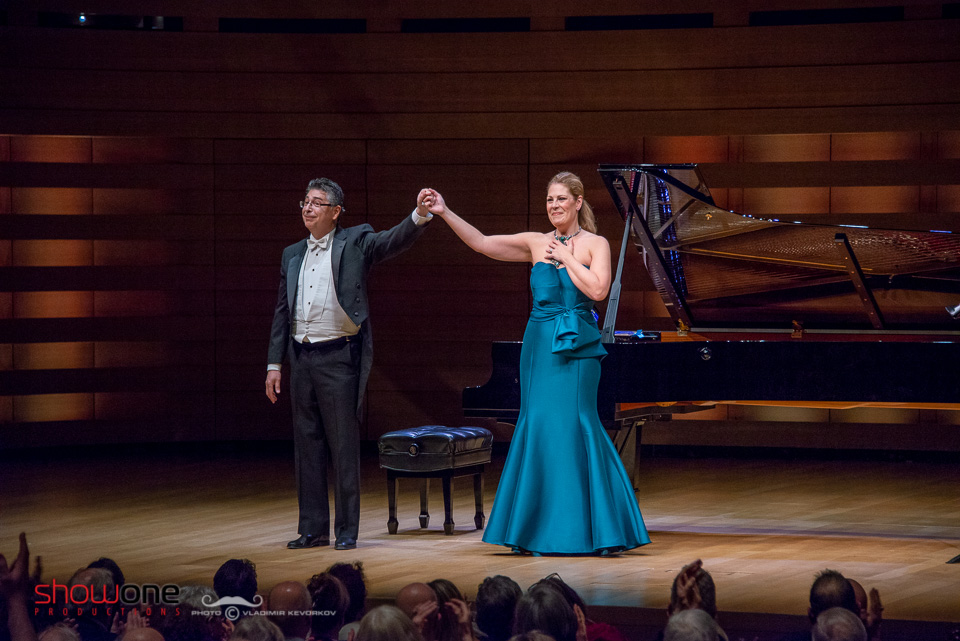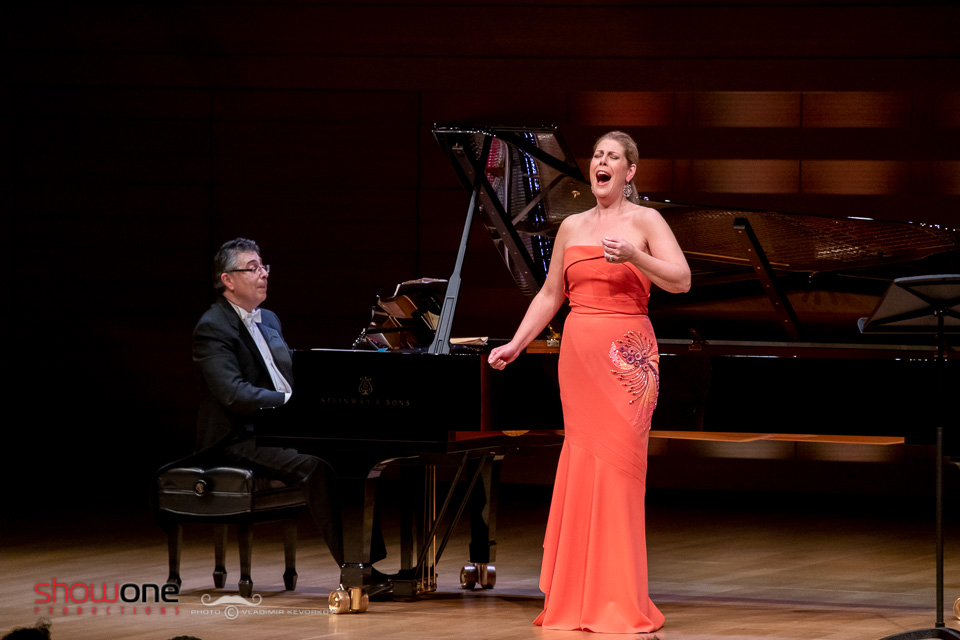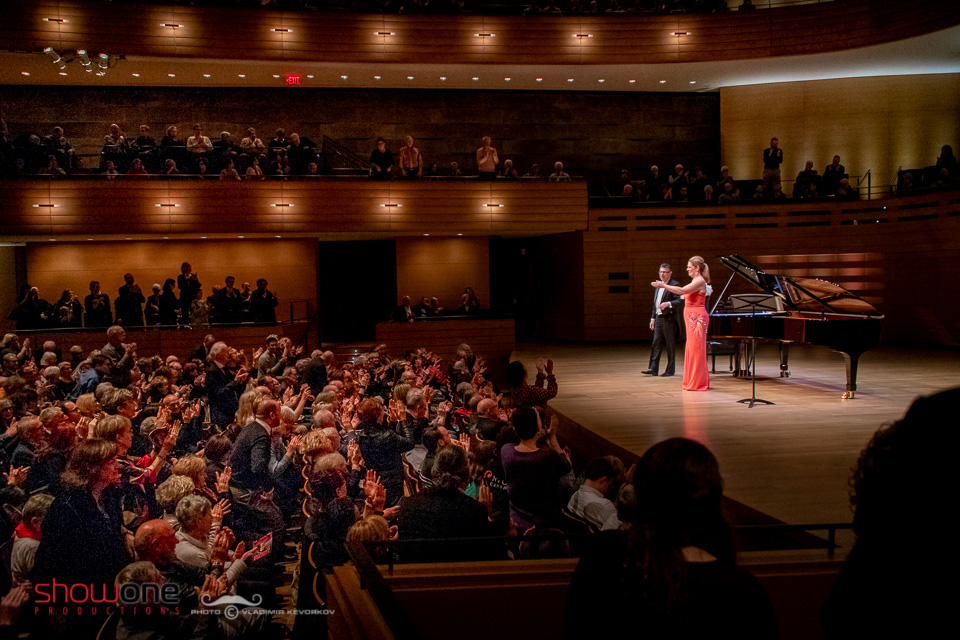
Photo: Vladimir Kevorkov, Show One Productions
Soprano Sondra Radvanovsky’s recital at Koerner Hall in Toronto this past weekend was a firm integration of her past, present, and future. The concert, presented to a sold-out audience, also served as a good catalyst for personal reflection, since it marked my first classical event since returning to Canada after living in Europe for close to four months. Contemplations on the role of evolution — artistic, personal, creative, emotional (or textured, painterly integration of them all) — progressed amidst a program which, despite its “bel canto to verismo” title, offered its own form of evolution as well, offering tasty morsels of Baroque works by Cacchini, Scarlatti, Fluck, and Durante, as well as later (much later) Italian composers Rossini, Verdi, and Puccini. The recital was a keen lesson on the importance of authenticity, grace, and generosity, qualities the American-born, Canada-dwelling soprano has in abundance. It also underlined the magic of transformative embrace, to beautiful effect.
Radvanovsky’s plummy soprano tone and supple vocalism, combined with an instinctual stage presence, have garnered her a host of fans, particularly following her triumphant series of performances as the female lead in bel canto “Tudor trilogy” by Donizetti (in both Toronto and New York) over the past few years. Many personal stories were shared throughout the evening, ones connecting circumstances with inspiration and opportunity with growth. Much like driving by an old house after moving (and yes I inadvertently did this myself recently), there was a nostalgic flavour to the proceedings, though it wasn’t necessarily a bad thing. Her coquettish rendition of Rossini’s boat-romance song cycle “La regata veneziana” (which she recalled performing as a young singer) was sharply contrasted by a theatrically gripping “Una macchia e qui tuttora!” from Verdi’s Macbeth. Radvanovsky subsequently revealed she will be making her role debut as the ambitious wife of Shakespeare’s doomed sovereign, though gave no indication of when. Will it be Toronto first and then New York, as was the case with her Donizetti Tudor roles? Only time will tell.

Photo: Vladimir Kevorkov, Show One Productions
After years of seeing Radvanovsky perform live, what I think makes her so powerful as an artist is her ability to meld blazing vocalism with charismatic theatricality; she physically acted out various scenes (from Roberto Devereux and Macbeth, for instance), reflecting the drama already so very present and palpable in her voice. Such a seamless fusion has won her many fans, both in her chosen country (she is American by birth but resides just outsides Toronto) and abroad. The recital was marketed (and largely perceived by her many fans) as a homecoming, something she fully embraced, giving the enthusiastic Toronto audience a total of four encores at the concert’s close, which included recital chestnuts “Chi il bel sogno di Doretta” from Puccini’s La Rondine, “Ebben? Ne andrò lontana” from Catalani’s La Wally, “Pace, pace, mio Dio” from Verdi’s La Forza del Destino (thrilling), as well as a very charming “Over the Rainbow”, complete with melodic piano flourishes from accompanist Anthony Manoli. What Radvanovsky gave, however (in bucket-fulls), was far more subtle than that which can be easily or quickly comprehended. The rapturous cheers may have come fast and furious, but I had to sit, at the close of each piece, quietly and carefully absorbing the innate artistry of what had just unfolded; it was like watching a plant grow from a spindly, fine, eyelash-like sprout, into a lush tree full of emerald-green, merrily waving leaves, all in the space of a few hours, or even bars. Radvanovsky took listeners on the journey of her ever-expanding evolution — artistic, creative, dare I say personal — and it was wondrous to behold.
Over the past fourteen months or so, a creative reawakening of sorts has occurred within me, and I’ve returned to the work of artists I’d once loved, and found connections to new ones who break down doors mental, spiritual, intellectual, and emotional; in the process my priorities and pursuits have evolved into something which is a far more accurate reflection of who and what I am as writer and music lover, outside of my mother’s considerable (traditional opera-loving) shadow. It has been a kind of homecoming in both personal and professional senses. Some homecomings, I realize more than ever, are more meaningful than others, and have absolutely nothing to do with geography. Just prior to returning, I had been told that I’d become “a lot more adventurous” in my musical tastes. This observation, made by a colleague, was flattering if heartening. Evolution is an interesting thing; sometimes it can be less about dramatic change than reclamation, exploration, and integration — reclaiming those more tender, curious parts of ourselves we have left behind, neglected, hidden away from view, exploring which parts fit now and which parts don’t, and integrating those parts with a worldly (we hope) adult self in a way that allows for the meeting of responsibilities while still leaving room for beauty, wonder, and surprise.

Photo: Vladimir Kevorkov, Show One Productions
Those qualities — beauty, wonder, surprise — were the ones I took away with me from Radvanovsky’s recital. Her fearless rendition of “Sola, perduta, abbandonata” from Manon Lescaut, was luscious, passionate, her tone entirely unforced; she sang with a sensual zeal I have not, for all the times I’ve seen her perform live, quite heard before, and it was, in a word, breathtaking. The recital pointed at exciting new directions, a potential being realized, a new self flowering naturally from the old — not a forced transition this, but a progression, an extension, a risk into the unknown that feels utterly, bracingly right. Is one to deny evolution in favor of the familiar? Very often one does, yet another path beckons, and when taken, can yield the most beautiful of results. Radvanovsky is taking that path, as her recital in Toronto on Saturday proved, and doing it in own inimitable way. Brava.

1 Pingback